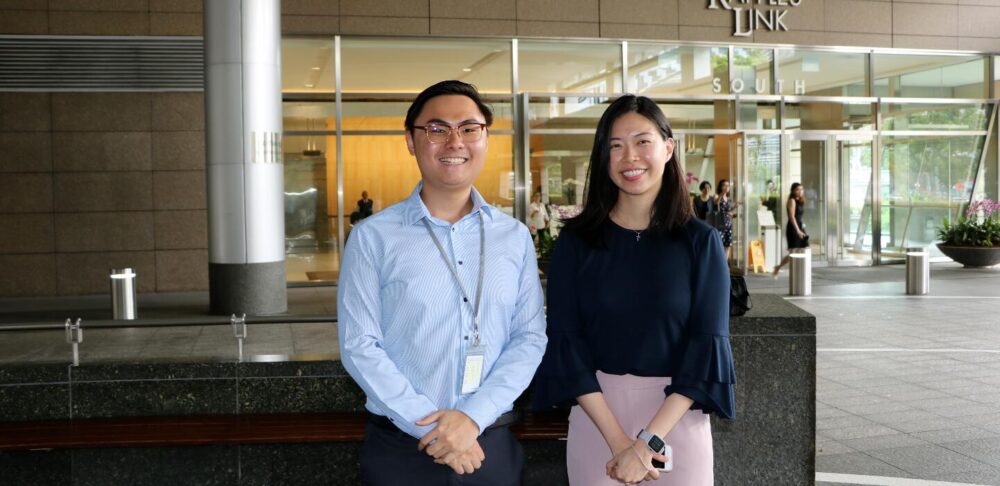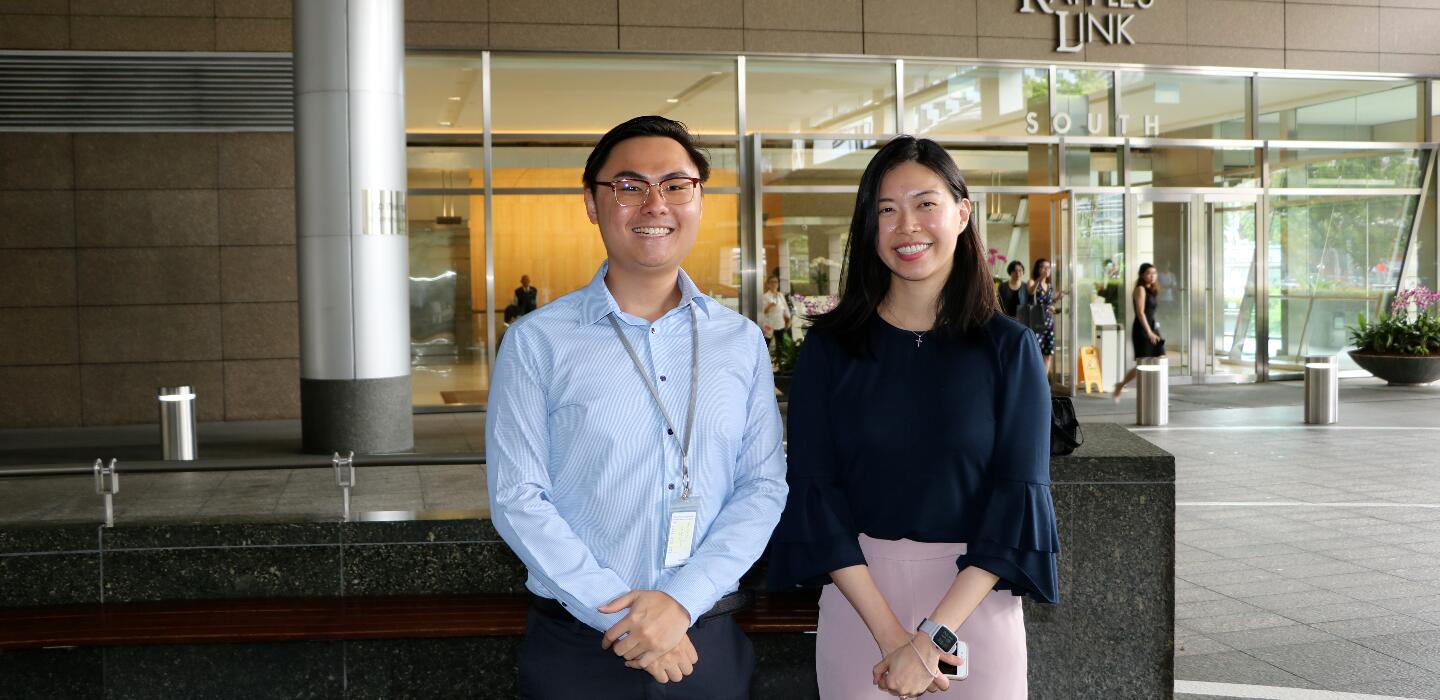Joyce Chee is an Sustainable and Impact Investing Advisor with Credit Suisse. She is part of of a team responsible for the bank’s impact advisory services as well as development of responsible, sustainable and impact investment initiatives in Asia/ She shares her experience working in fund management and impact investment.
Q: Could you share with us your experience as Sustainable and Impact Investing Advisor of Impact Advisory and Finance Department (APAC) and a short summary of a normal working day for you?
I started my career in Credit Suisse, and this is my ninth year with the bank. I have been very blessed with very good bosses and sincere colleagues since the start of my career. This has nurtured me for my role today. Since 2014, I have been working in various capacities across sustainable and impact investing, as well as philanthropy – various solutions that seek to address social and/or environmental challenges that the world faces today.
My day-to-day consists of conducting impact assessment, due diligence on private companies across Asia, and, working with internal stakeholders such as various investment product owners of mutual funds, mandates and structured products to enable more sustainable and impact investment solutions for our clients, as well as educating colleagues and clients on the approach of sustainable, and impact investing.
Q: What was your aspiration when you first started out?
With a major in finance, I was applying mostly to banks when I graduated. I did not have a very specific career goal then. When I got my first job, like most fresh graduates, I worked extremely hard, putting in additional hours to ensure a high standard of work. Soon, after working for 2.5 years, I approached my 25th birthday, a time that I personally call my “quarter-life moment”, which led to my calling. I looked back at the past years and started questioning if this was a role which I could see myself continuing in for the next 10 years. Back then, I enjoyed doing funds analysis and had a great working environment with very supportive bosses and colleagues, there was nothing to push me away from the role. However, I wanted more.
I believe everyone is motivated by different things in their career – it can range across many factors from working environment, salary, corporate advancement, or simply the work itself. I realise that I wanted to be able to contribute socially from my work itself. I considered going into the social services sector, but was inclined to also remain in the company as I really enjoyed working in the banking industry, at Credit Suisse.
During that time, I was introduced to the topic of impact investing by my previous boss, and on my birthday, I also picked up a book by Professor Muhammad Yunus called ‘Banker to the Poor’. I was fascinated to learn that there was such an approach to investing which combined financial and social returns. Understanding that I could potentially achieve making a social impact within a banking and finance setting, I got very excited.

(Right) Joyce Chee
Sustainable and Impact Investing Advisor, Vice President of Impact Advisory and Finance (IAF) Department (APAC) at Credit Suisse
Bachelor of Business Administration - Finance and Technopreneurship (2010)
Q: What were the struggles and transitions?
Back then, impact investing was still very niche in Singapore. Though then with a goal in mind, I was unsure where to start. I did not have any relevant experience. There were only 1 or 2 dedicated impact investment managers who had offices in Singapore and they largely hired people who had investment banking background. One of the attempts to associate myself with this topic and to network, was to update my Linkedin profile to include my interest in learning more about the topic.
The toughest part was identifying my aspiration and working towards it at 25 years old. If I did not have the dream, I could probably continuing doing well in what I did, but without much purpose. Once I established my dream, I felt excited yet unsure how that desire would become a reality. Back then, when I realised that I could not simply apply into an impact investment company with my experience, I explored a couple of different routes. I started considering other departments within the bank to build up relevant experience for impact investing. I shared this with my boss and she was very supportive of my aspiration.
The struggle was deciding which next step would bring me closer to impact investing. I weighed in on factors such as how I would be able to find meaning directly already in this next move (though not yet at impact investing), learning runway, career advancement opportunities and monetary benefits.
After thinking through, I made the decision with a lot of peace. I chose the work which was aligned with my social purpose and found meaningful. I applied for a role in Philanthropy Advisory. I was hired into the team and enjoyed partnering with clients to support them in their philanthropic efforts. Eventually, I also had the opportunity to be part of the team that pioneered and developed an Asia focused impact investing product.
While my path was indirect, I am thankful to be living my dream today.
Q: What do you think are the tricks of the trade for people interested in Asian Equity Mutual Funds, and Sustainable and Impact Investing?
I had a mentor when I started out in the funds team. He imparted me with the techniques of interviewing a fund manager. Being able to assess a fund manager requires skills and experience. Before one can do it, one needs to be well read and updated with financial market news. Once you are well-equipped, you must analyse how the fund performs versus their peers, the fund manager’s investment philosophy and process, factors behind his various decisions, knowing the market well and getting both the breadth and depth.
For impact investing, as a start it is important to understand its definition and the different terminologies. The whole topic of sustainable and impact investing is at a very exciting phase in Asia now, it is a lot less obscure compared to 5 years ago. For those in school considering impact investing, I would suggest considering a sector and build up sectoral knowledge, such as in agriculture, affordable housing, etc. Take up voluntary work that support enterprises that are solving for social or environmental issues, be it building their valuation models, or contributing research for their impact assessment. Get involved through clubs in school or even those outside, and simply be exposed to understanding the various business models.
Q: What do you think are the trends in Sustainable and Impact Investing?
This is clearly a growing trend, assets allocated into sustainable investing and more specifically impact investing have grown significantly. Out of 88 trillion USD assets under management globally, a third of that is now managed sustainably. It is also estimated by GIIN that the assets under management globally in impact investing is about 502 billion USD.
At the very least, I also expect to see more investment products that integrate ESG surfacing in the market, to cater to the growing demands from investors.
This trend continues to be fuelled by the rise in Next Gen investors who are very interested in the topic, and want to align their social values with their investments. I see many of such investors who belong to the millennial generation being very interested to be educated on the topic.
The Alumni Spotlight Stories is a regular series that explores a Bizad alumni’s journey from school to the working world. The story was first published in “Alumni Spotlight Stories: From Student Life to the Peak of your Career” compiled by the NUS Business School Alumni (NUSBSA).




